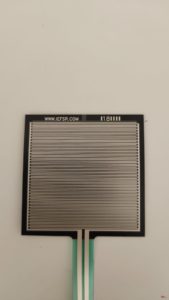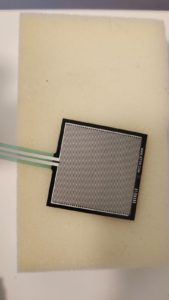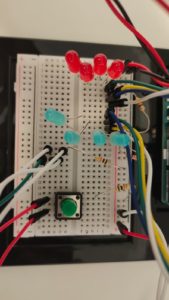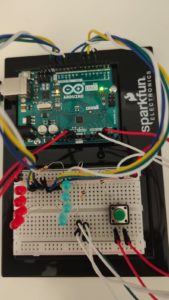Description:
I decided, after a struggle of thought, to make a simple water refill reminder. Drinking water is crucial and many people tend to try to forget. So I made this simple water that detects the weight of the bottle and knows how much water is left in the bottle/cup using a force sensor.
 using the force sensor on its own did not give a range of weight enough for the water weight detector. so I decided to place the force sensor on a sponge.
using the force sensor on its own did not give a range of weight enough for the water weight detector. so I decided to place the force sensor on a sponge.
I also used an on/off button that turns the circuit on when pressed and off when pressed once more
I also used 4 red lights that are more likely to capture someone’s attention and remind them to refill their water bottle when it’s empty.
and I used 4 blue led lights, more of the blue lights light up the more water there is in the bottle.
this is how my circuit looks:
the last set of wires that are neither connected to the button or the less is connected to the force sensor.
video:
the video shows how the circuit works:
Code:
const int outs[] = {3, 5, 6, 9,
10, 11, 12, 13
};
const int ins[] = {A2, A3};
int var, var2, b, r, maxx = 0;
long timer;
bool turnon = 0, curr, prev;
void setup() {
Serial.begin(9600);
for (int i = 0; i < sizeof(outs); i++) {
pinMode(outs[i], OUTPUT);
}
Serial.begin(9600);
for (int i = 0; i < sizeof(ins); i++) {
pinMode(ins[i], INPUT);
}
}
void loop() {
if (curr != prev && curr == 1) {
turnon = !turnon;
}
curr = digitalRead(ins[1]);
timer = millis();
var = analogRead(ins[0]);//0-250
var = map(var, 0, 500, 0, 255);
var2 = constrain(var, 250, 255);
Serial.print(" on: ");
Serial.print(turnon);
Serial.print(" curr: ");
Serial.print(curr);
Serial.print(" prev: ");
Serial.println(prev);
if (turnon == 1) {
on();
}
else {
for (int i = 0; i < 8; i++) {
analogWrite(outs[i], 0);
}
}
//
prev = digitalRead(ins[1]);
}
void redled(int n) {
if (timer % (n * 4) < (n * 1)) {
analogWrite(outs[4], var2);
analogWrite(outs[5], 0);
analogWrite(outs[6], 0);
analogWrite(outs[7], 0);
}
else if (timer % (n * 4) < (n * 2)) {
analogWrite(outs[4], 0);
analogWrite(outs[5], var2);
analogWrite(outs[6], 0);
analogWrite(outs[7], 0);
}
else if (timer % (n * 4) < (n * 3)) {
analogWrite(outs[4], 0);
analogWrite(outs[5], 0);
analogWrite(outs[6], var2);
analogWrite(outs[7], 0);
}
else {
analogWrite(outs[4], 0);
analogWrite(outs[5], 0);
analogWrite(outs[6], 0);
analogWrite(outs[7], var2);
}
}
void on() {
if (var < 20) {
b = -1;
r = 4;
}
else if (var < 140) {
b = 0;
r = 0;
}
else if (var < 260) {
b = 1;
r = 0;
}
else if (var < 380) {
b = 2;
r = 0;
}
else {
b = 3;
r = 0;
}
// there is water
if (r == 0) {
for (int i = 0; i < b + 1; i++) {
analogWrite(outs[i], var2);
}
for (int i = 7; i > b; i--) {
analogWrite(outs[i], 0);
}
}
else {
for (int i = 0; i < 4; i++) {
analogWrite(outs[i], 0);
}
redled(1000);
}
}



